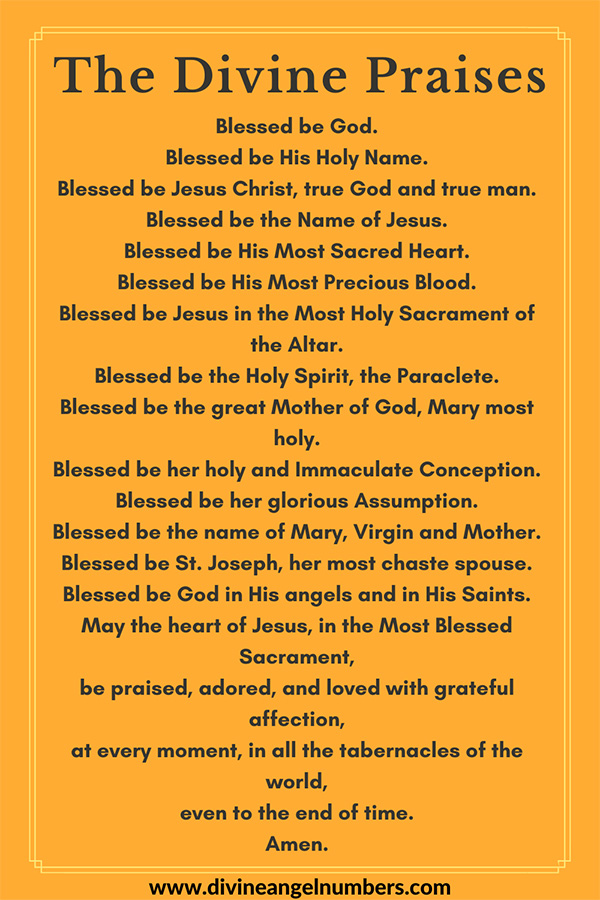History of Divine Praises Prayer
The Divine Praises or Laudes Divinae, which is more informally known as Blessed Be God is an 18th Century Roman Catholic prayer that is recited during the Benediction of the Blessed Sacrament. The prayer was originally written by Jesuit priest Luigi Felici in 1797.
Its main purpose was making reparation after saying or hearing sacrilege or blasphemy. People say the prayer after hearing, seeing, or inadvertently uttering some form of profanity or blasphemy.
Pope Pius VII expanded the prayer in 1801. And the expanded version became a popular recitation that is followed by the Benediction. The priest usually recites each line of the prayer and that line is repeated by the congregation in unison before the Jesus Eucharist is returned to the tabernacle following Adoration.
Divine Praises Prayer
Divine Praises
Blessed be God.
Blessed be His Holy Name.
Blessed be Jesus Christ, true God and true man.
Blessed be the Name of Jesus.
Blessed be His Most Sacred Heart.
Blessed be His Most Precious Blood.
Blessed be Jesus in the Most Holy Sacrament of the Altar.
Blessed be the Holy Spirit, the Paraclete.
Blessed be the great Mother of God, Mary most holy.
Blessed be her holy and Immaculate Conception.
Blessed be her glorious Assumption.
Blessed be the name of Mary, Virgin and Mother.
Blessed be St. Joseph, her most chaste spouse.
Blessed be God in His angels and in His Saints.
May the heart of Jesus, in the Most Blessed Sacrament,
be praised, adored, and loved with grateful affection,
at every moment, in all the tabernacles of the world,
even to the end of time.
Amen.

Significance of Divine Praises Prayer
The Divine Praises is a prayer that is usually prayed as a reparation for blasphemy and profane language. The series of acclamations is composed in the prayer bless God the Father, Jesus Christ, the Holy Spirit, the Blessed Virgin Mary, St. Joseph, and all the other angels and saints. There are several occasions in our day-to-day life where we can hear people refer to God in an exclamatory fashion after an accident or mishap.
With the help of this litany, we can sing the praises of God. According to Saint Thomas Aquinas reciting the Divine Praises to God increases the fervor of our devotion to Him. He says that we should, “praise God not for His benefit but for ours.” This is because it reminds us of the many glories of the Holy Trinity and the key role the Blessed Virgin Mary, St. Joseph, and the angels and saints play in our salvation.
Read more: Hail Holy Queen Prayer (Salve Regina)

Conclusion of Divine Praises Prayer
Blasphemy is described as an action or offense of speaking sacrilegiously about God or sacred things. The Catechism of the Catholic Church exclaims that “blasphemy consists of uttering words of hatred, reproach, or defiance, inwardly and outwardly.”
It also includes not being respectful toward God and misusing His name. Blasphemy and the use of profanity are incredibly common in our speech.
Therefore, in 1797, Jesuit Priest Luigi Felici composed the Divine Praises as a way of making reparations for the blasphemies. This prayer is a way to honor and praise God. It is considered a fitting way to praise God, as he has blessed us with his presence in the Blessed Sacrament.
The prayer which is informally known as Blessed Be God is recited in many countries immediately after the blessing of the Blessed Sacrament in Benediction.
Read more: The Holy Rosary



